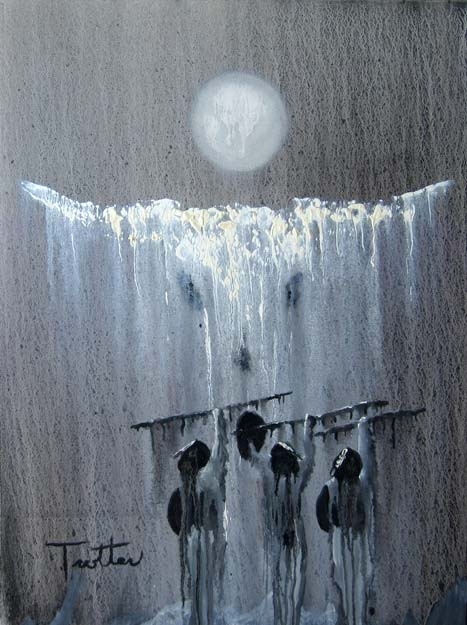Are you a believer in ghosts, my friend?
Haul in the chains. Let the carcase go astern… It is still colossal.*
Reading Toni Bernhard‘s article recounting the life story of the Buddha on the recent Psychology Today blog (link at bottom), together with some comments about it on the Secular Buddhist Facebook page, brought back a memory. Several years ago an editor at Routledge Press asked me to write a new biography of the Buddha. I discussed the idea with my agent, who thought it was something worth exploring. Little did I know at the time that this “exploration” would bind me to the mast of the Pali canon as it plowed unrelentingly through the ocean of the dispensation. Like Ahab, I single-mindedly searched and searched for that elusive object of desire: flesh and blood of the living Buddha. But unlike Ahab, after three years immersed in the search I found not so much as a scrap of flesh or a trace of blood of any historical being. For all literary presentations of the Buddha, man, are but as pasteboard masks.**
In a post here called “Nostalgia for the Buddha,” I worked up some of my notes from that doomed project. Bernhard’s article, though, makes me wonder anew: Why, why do x-buddhists continue to embrace this Sunday-school fable of the Buddha? It is particularly curious that the scientifically-allied, ostensibly de-mythologized modern variety of x-buddhists do, isn’t it? Why this recurring, and seemingly unacknowledged (by x-buddhists, at least), argument from authority? And why this dishonesty about the lack of reliable data for the so-desired Authority? Or is it ignorance rather than dishonesty? And if ignorance, is it the dark unknowing kind or the willful variety? I admit that, in past writings, I myself have done some damage in arguing for the reconstruction of a recoverable historical figure named “Gotama.”
Let me repent. My several years’ effort of searching for a reliable historical basis for a biography of Siddhattha Gotama can be summed up as this: Gotama is a ghost. He is a non-entity. Let me elaborate (from “Nascent Speculative Non-Buddhism“):
Protagonist, The. The progenitor of the Buddhist dispensation. He is referred to by various names, such as “The Buddha,” “Gotama,” “The Blessed One,” etc. Speculative non-buddhism’s designation “The Protagonist” is intended to indicate the irrefutable fact that “the Buddha” is a historical figure entirely overwritten by a literary one. Not the slightest wisp of evidence has survived that sheds light on the historical progenitor. Any reliable historical evidence that once existed has been reduced to caricature by the machinations of internecine Buddhist institutional shenanigans and the stratagems of ideological dupery. The figure of the Buddha in the classical Pali texts is a concoction of the collective imaginations of the numerous communities that, over several centuries, had a hand in the formation of the canon. Add to this imaginative mélange the imaginings—cultural, political, fantastic, ignorant—of all the iterations of all forms of x-buddhism, and the result is Buddha as Cosmic Magic Mirror, reflecting all things to all people. A viable composite human figure “The Buddha” can be salvaged from this protean symbol of buddhistic vanity only with force of the darkest, most atavistic yearning of puerile nostalgia for The Great Father.
So, here’s my question: Why, given their ostensible sophistication, do contemporary x-buddhists cling so stubbornly (ignorantly? something else?) to a naïve understanding of the very nature of the texts and teachings from which they derive so much authority for their lives?
Another question (added 12-5-11): How would your reception of Buddhism be affected if you saw it as a hodge-podge of often disconnected ideas and theories about human being (which it is)?
What are your thoughts?
- Herman Melville, Moby Dick, chapter sixty-nine.
** Ibid., chapter thirty-six: “All visible objects, man, are but as pasteboard masks.”
Toni Bernhard’s article, “Who was the Buddha?”
Image by Patrick Trotter, “Ghost Dance.”


What do you think?